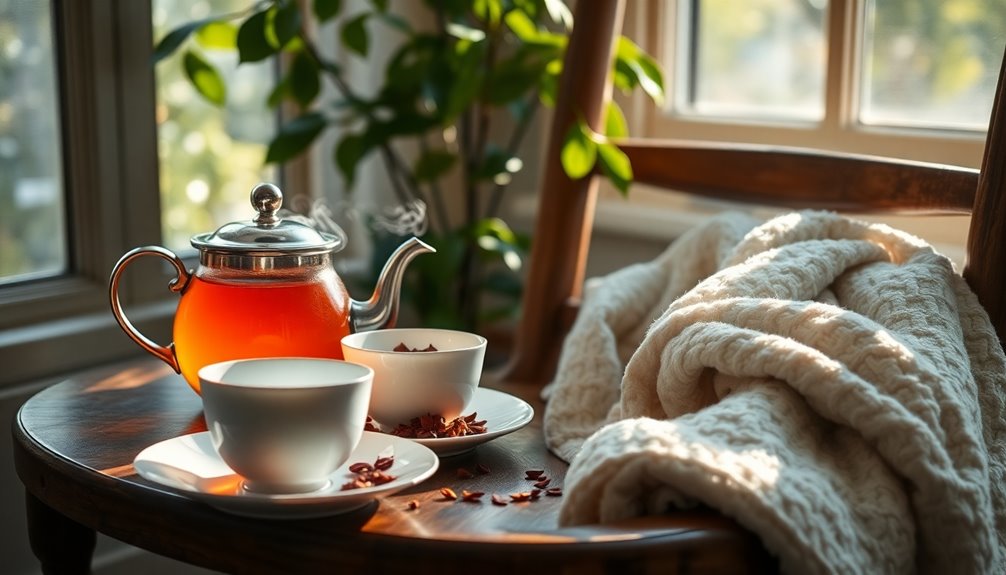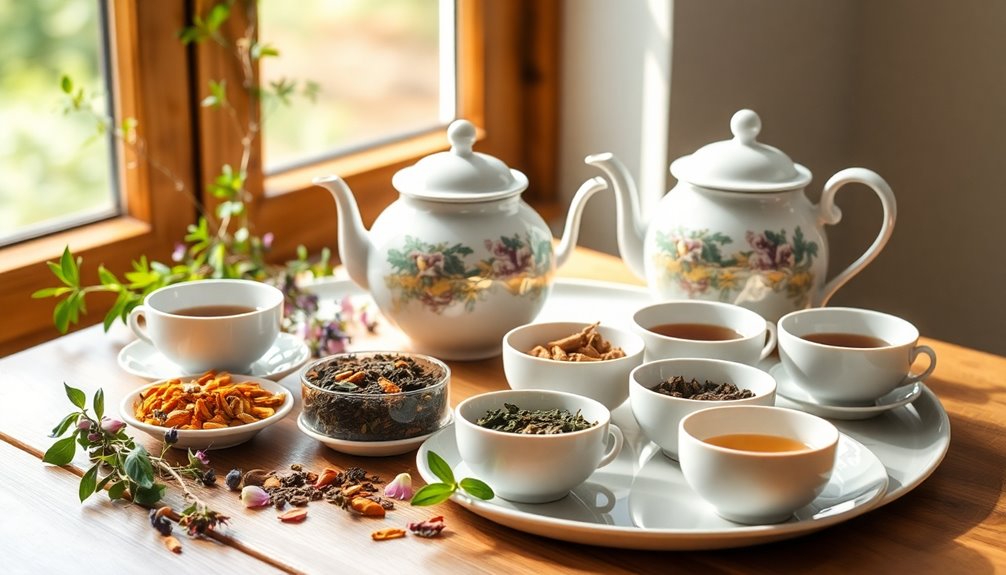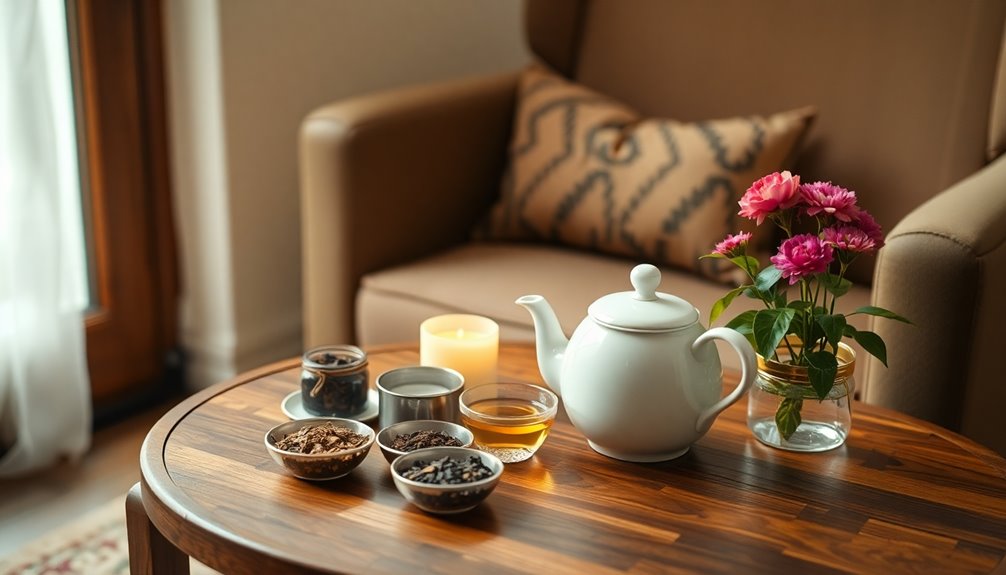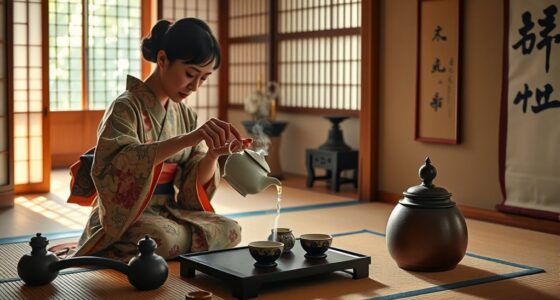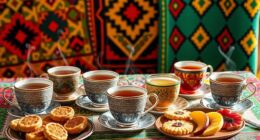Transform your life with daily tea rituals that boost your well-being and mindfulness. When you set aside time for tea, you create moments for relaxation and self-reflection. Each cup encourages you to embrace tranquility, enhancing mental clarity as you savor flavors and aromas. Tea also fosters connection, making it perfect for intimate conversations with friends and family. By being mindful of caffeine sensitivity, you can choose teas that support relaxation without jitters. With the right preparation, you'll find that tea can be both a calming ritual and a delightful experience. Stick around, and you'll uncover more tips for enriching your tea journey!
Key Takeaways
- Establish a morning tea ritual to promote mindfulness and focus, setting a positive tone for your day.
- Engage in an evening tea ceremony with calming herbs like lavender to enhance relaxation and improve sleep quality.
- Experiment with different tea blends and preparation methods to discover unique flavors that elevate your tea experience.
- Incorporate tea meditation into your daily routine to reduce stress and enhance mental clarity through intentional sips.
- Share tea with friends or family to foster deeper connections and create meaningful memories through shared experiences.
Introduction
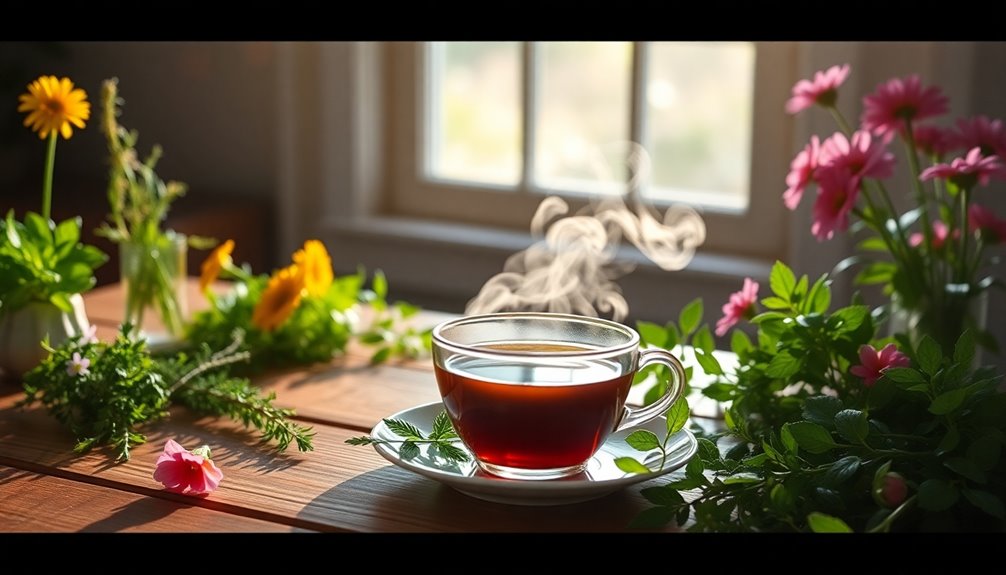
In today's fast-paced world, incorporating daily tea rituals into your routine can transform how you experience each moment. By setting aside time for tea, you create structured moments for relaxation and self-reflection that enhance your mental well-being and focus. Tea, like coffee, is also rich in antioxidants which can combat oxidative stress and contribute to overall health. Herbal teas, in particular, are known for their medicinal properties, providing a range of benefits for both mind and body. For example, oolong tea is rich in polyphenols, which are beneficial for health.
Whether it's a morning cup of green tea for clarity or an evening herbal blend to unwind, these rituals can elevate your daily lives. Engaging in tea time allows you to savor the flavors and aromas, promoting mindfulness and a heightened appreciation for the present. The act of preparing tea, like whisking matcha, can become a meditative practice, encouraging deep breathing and intentional living. Additionally, incorporating flower teas' calming effects can further enhance your relaxation experience.
This self-care moment serves as a calming anchor amid the chaos of your day, reminding you to slow down and reconnect with yourself.
Tea's Role in Mindfulness
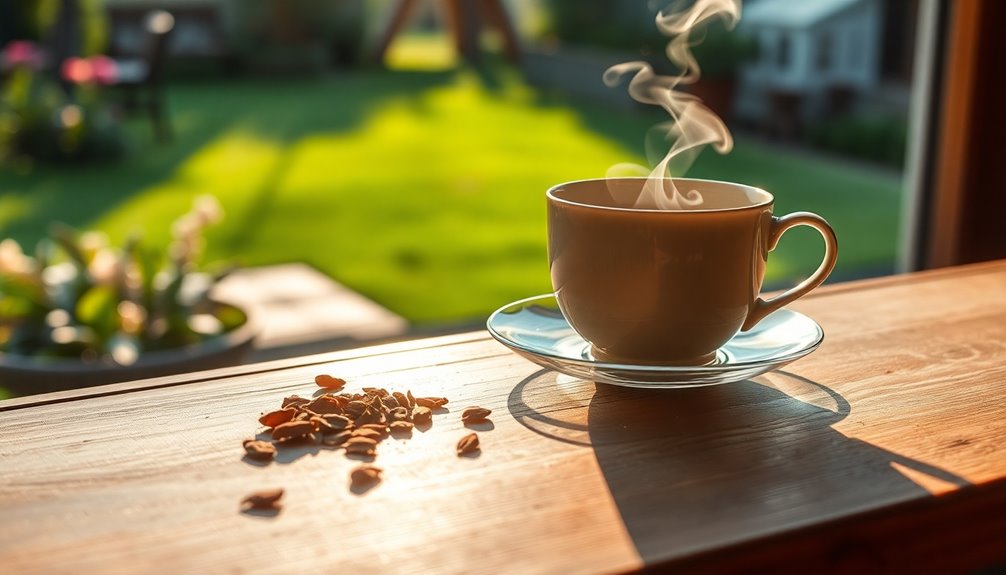
Mindful tea rituals offer a powerful way to ground yourself in the present moment. When you engage in the art of drinking tea, you transform a simple act into a meaningful ceremony.
Selecting your tea leaves and steeping them at the right temperature becomes a meditative practice that encourages mindfulness and self-reflection. Observing the water change as it interacts with the tea leaves helps you stay present, enhancing your mental clarity.
As you savor each sip, you deepen your appreciation for the flavors and aromas, creating a calming experience that can reduce stress. This ritual not only becomes a form of self-care but also provides structure in your daily life.
Incorporating mindful breathing exercises during tea preparation can further enhance relaxation and promote emotional resilience.
Tea Enhances Relaxation Response
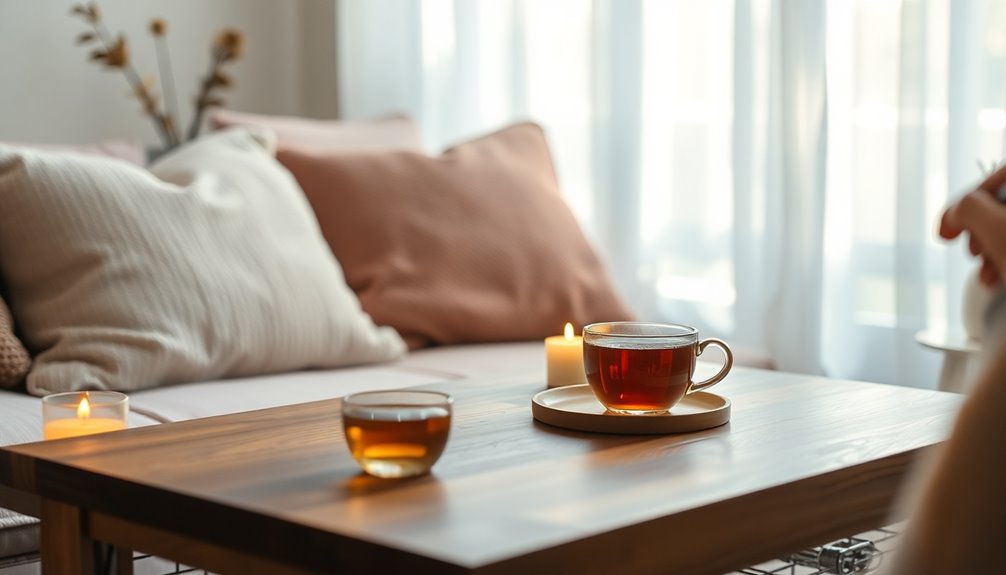
Tea's calming properties make it an ideal companion for enhancing your relaxation response. When you sip on a warm cup of green tea, you're not just indulging in a beverage; you're engaging in a daily ritual that promotes mindfulness and self-care. The antioxidants in Japanese green tea help soothe your mind, creating a peaceful state conducive to relaxation. Additionally, the caffeine content in green tea is lower than that of many energy drinks, making it a gentler choice for relaxation. *Moreover, tea can also contribute to improved air quality through its calming effects on the mind and body, similar to the benefits of using air purifiers.*
Incorporating tea into your daily routine encourages intentional moments for self-reflection. Whisking matcha, for instance, becomes a meditative practice that invites deep breathing and focus. This simple act can foster emotional resilience, allowing you to navigate stress more effectively.
Moreover, the tannins found in tea enhance your concentration, helping you achieve a more relaxed mental state during demanding tasks. By preparing and savoring tea, you engage your senses, creating a calming environment that supports your overall well-being. The ritual of the traditional tea ceremony can further deepen your connection to these calming effects and enhance your practice.
Make it a point to enjoy tea three times a day, and notice how these rituals transform your day-to-day life. As you cultivate this practice, you'll find yourself better equipped to embrace relaxation, enhancing both your productivity and emotional health.
Tea as a Social Connector
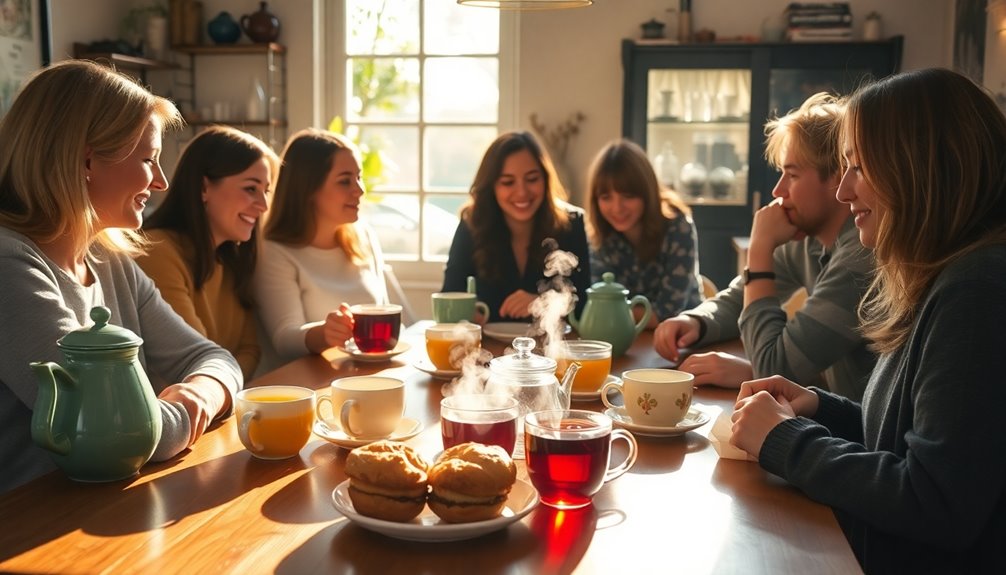
Sharing a warm cup of tea naturally brings people together, fostering relaxed and intimate conversations that deepen connections.
Whether it's a casual tea time with friends or a family gathering on the weekend, these moments allow you to share tea while creating memories that last a lifetime. Engaging in tea gatherings enhances the sense of community, where you can explore various teas and participate in cultural exchange, learning about different traditions and brews.
Herbal tea rituals can also be a wonderful way to involve children, introducing them to the joy of tea in a healthy, non-caffeinated way.
The beauty of tea lies in its versatility, offering personalized experiences where you can choose specific blends based on your mood or the occasion. Imagine hosting a gathering where everyone brings their favorite tea, sparking conversations and laughter as you discover new flavors together.
Ultimately, tea serves as a social connector, inviting deeper relationships and fostering a sense of belonging.
Caffeine Sensitivity and Tea Consumption

Caffeine sensitivity can significantly impact your tea-drinking experience, making it essential to choose your brews wisely. If you're sensitive to caffeine, even small amounts from tea can trigger heightened anxiety, restlessness, or insomnia.
Black tea, with its 40-70 mg of caffeine per 8 oz serving, can be particularly challenging. In contrast, green tea contains less caffeine, around 30-50 mg, but it's still crucial to monitor your intake.
To maintain a balanced tea consumption, consider incorporating herbal teas like rooibos or chamomile. These options are naturally caffeine-free and can provide relaxation without the stimulant effects of traditional teas.
Consuming tea earlier in the day can also help, giving your body ample time to metabolize caffeine before bedtime.
If you're looking to adjust your caffeine intake, try gradually reducing it by alternating between caffeinated and herbal teas. This method not only helps you adapt comfortably but may also aid in reducing inflammation, enhancing your overall well-being.
Practical Applications
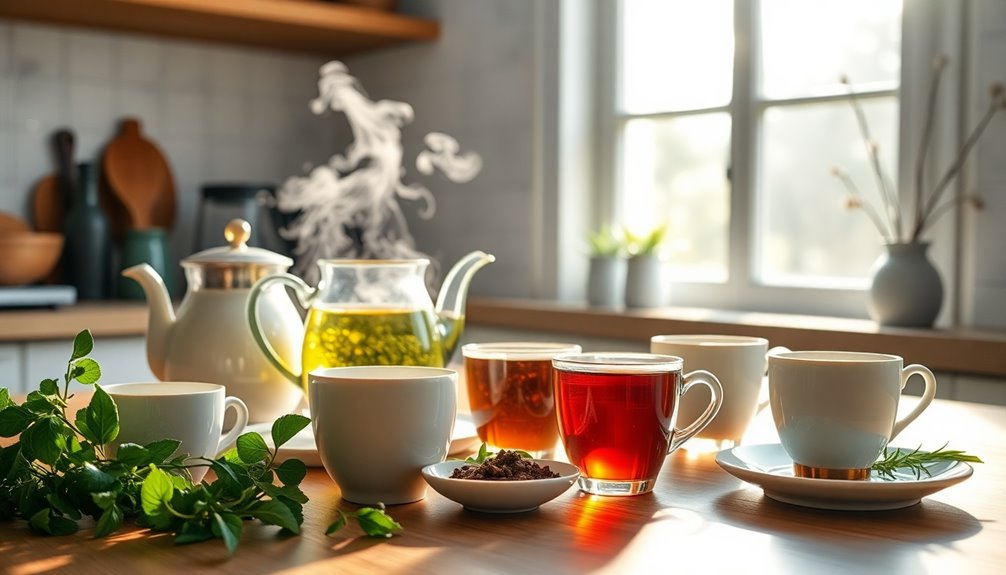
Creating a daily tea ritual can enhance your overall well-being and provide moments of peace in a busy life. Start by designating specific times for your rituals, like after breakfast, during an afternoon break, or before bed. This structure helps foster relaxation and gives you something to look forward to each day.
Choose a tranquil space for your tea time, incorporating soft lighting and calming decor to enhance the experience. Experiment with different types of loose-leaf teas to discover flavors that resonate with you. Green tea offers antioxidants, while herbal teas can promote relaxation, making your cup of tea a delightful form of self-care. You might also consider adding essential oils to your ritual, as they can further enhance your relaxation experience. Additionally, herbal teas like chamomile can further support your emotional well-being.
Engage in mindfulness while preparing your tea. Observe the transformation of water and tea leaves, and take a moment to appreciate the process.
During steeping, incorporate breathing exercises or quiet reflection to deepen the meditative quality of your ritual. This practice not only promotes mental clarity but also builds emotional resilience. Additionally, consider incorporating aromatherapy with essential oils like lavender to further enhance your relaxation experience. Drinking rooibos tea may also contribute to your overall health, as it is rich in antioxidants.
Conclusion
Incorporating daily tea rituals into your life can truly transform your well-being. By embracing mindfulness, enhancing relaxation, and fostering connections, tea becomes more than just a beverage; it's a path to greater self-discovery and joy. Whether you're navigating caffeine sensitivity or simply enjoying a moment of calm, these practices can enrich your daily routine. So, pour yourself a cup, savor each sip, and let the warmth of tea guide you toward a more balanced and fulfilling life.

